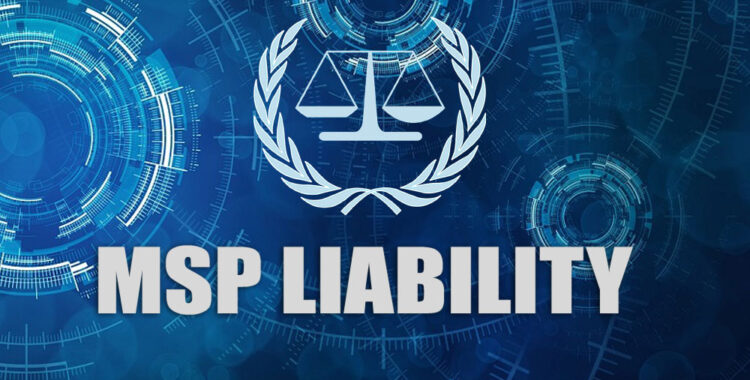What Can Managed Service Providers (MSPs) Do To Minimize Liability?
As a Managed Service Provider (MSP), if one of your clients falls victim to a cyberattack you could be liable for damages. It’s crucial to recognize and understand the potential situations where you may be left holding the bag. These could include security breaches, data loss incidents, and failure to comply with relevant regulations like HIPAA or GDPR. To effectively minimize liability as an MSP, several key steps should be taken to mitigate risks and protect both your company and your clients.
1. Find the Right MSP Lawyer. Make sure you consult with an MSP attorney who specializes in working with MSPs and IT providers. Some MSPs try to create their contracts on their own – clearly this is a bad idea. A competent and experienced MSP attorney can readily identify the necessary clauses and properly draft them using the right contractual language. In short, appropriate legal expertise can help ensure that your contracts are comprehensive and protective.
2. Make Sure Your Contracts Are Robust. Ensure that your contracts, including master service agreements (MSAs), service level agreements (SLAs), scopes of work (SOWs), contain clauses that clearly define your responsibilities and limitations of liability. Protect yourself from third-party failures by disclaiming responsibility for hardware or software issues caused by manufacturers or vendors. Similarly, include clauses addressing backup failures and ransomware incidents, specifying the responsibilities of the client in such scenarios. Ensure that your contracts align with insurance requirements, disclaiming third-party failures, specifying backup responsibilities, and outlining insurance obligations. Regularly review and align indemnity provisions in customer contracts with insurance coverage. This will help ensure that potential liabilities are adequately covered by insurance proceeds.
3. Invest in Insurance. Insurance plays a crucial role in mitigating liability risks. Generally speaking, no MSP should go without general liability insurance, professional errors and omissions (E&O) coverage or cybersecurity insurance, all of which provide essential protection against various types of liabilities. You should also advocate for your clients to acquire first-party cyber liability insurance. This will not only benefit them but also indirectly reduce your potential exposure.
4. Create Standardized Processes. Develop well-documented processes and templates for delivering your services. Utilize refusal waivers to document instances where clients choose not to comply with recommended security measures. This will not only help mitigate the risk of being sued for negligence or weak security practices but also establish a clear framework for liability management.
Completely eliminating liability is an unrealistic goal. However, by taking these proactive measures, MSPs can minimize their potential exposure and protect their clients in the process.
Whether you are an MSP, business end user, channel partner or anyone else with a telecommunications, IT or cloud matter need, contact telecommunications lawyer Ben Bronston today at 1-888-469-0579 for a confidential consultation.


 Ben Bronston
For more than 25 years, Ben Bronston has represented clients in the telecommunications and information technology (IT) Industries,including agents, master agents, VoIP providers, MVNOs, VARs, MSPs, data centers, carriers, resellers and their enterprise customers as well as consortiums of Telecom and IT providers.
Ben Bronston
For more than 25 years, Ben Bronston has represented clients in the telecommunications and information technology (IT) Industries,including agents, master agents, VoIP providers, MVNOs, VARs, MSPs, data centers, carriers, resellers and their enterprise customers as well as consortiums of Telecom and IT providers.









